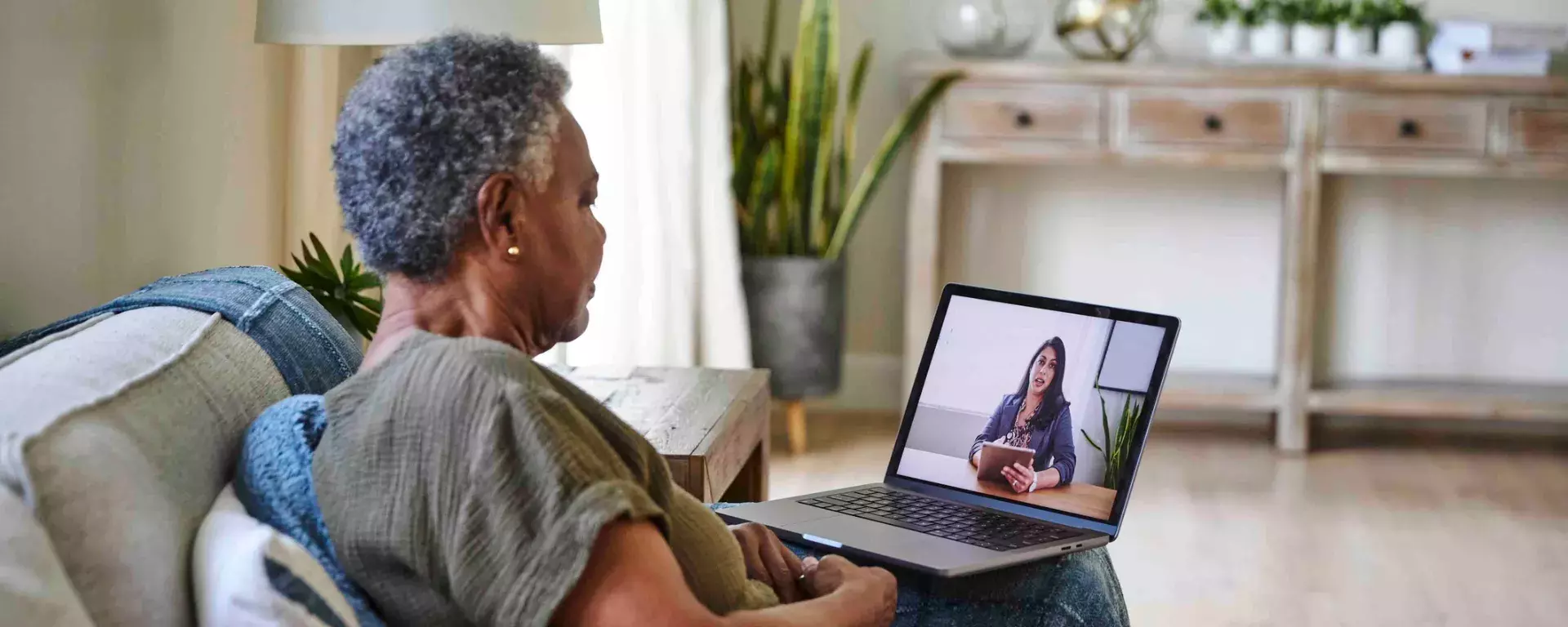Important: We expect video consultations to be introduced in the coming months for this benefit.
Step by step advice leading up to, during and after your video consultation
Select from the below options to jump down to the relevant section:
Let us know if you would like to...
- Change your appointment - it's really important that you keep your appointment. If you don't, we will return your claim to DfC. If you cannot keep your appointment for any reason, tell us straight away. You can only change your appointment once.
- Request a language translator or British/Irish Sign Language interpreter.
- Request an appointment with a health professional of a specific gender.
If you are looking for information about the video relay service for British/Irish Sign Language users, Click here.
What you need for your consultation
A desktop computer, laptop, tablet, or mobile phone that has a front-facing camera, speakers, and a microphone.
A good, stable internet connection. If you can watch a video online without any problems, your internet connection should be suitable for a video consultation.
A private, well-lit area where you will not be disturbed.
One of these browsers:
Safari (Apple computer, iPad or iPhone)
Google Chrome (Windows computer or Android tablet/smartphone)
Microsoft Edge (Windows computer)
Find more information about what you will need for your video consultation.
If you are using a Samsung mobile phone for your video consultation, you may have an issue with your browser. If you see the error screen, please copy and paste the link to the waiting room into Google Chrome. If you do not already have Google Chrome, you can download it. You could also try using a different device, if you have one.

If you do not have one or more of the above, or your health condition or disability means that you are not able to take part in a video consultation, please contact Capita straight away. This is so that we can discuss the best way to carry out your consultation.
Check your device is set up correctly
It is useful to check that your device is set up correctly before your video consultation. Test your device.
If your device is set up correctly, you will see the screen showing 'You are ready to make calls'.

If we notice that something isn't quite right, you may see the ‘Testing in progress’ screen.

This is usually easy to fix. Find more information on how to get your device ready for your video consultation.
New evidence
If you have any new evidence of how your health condition or disability affects your daily life, please discuss this with the health professional. You will need to send a copy of this to DfC after your consultation. | Please send any new evidence to: Freepost RTRT-EKUG-KXJR |
Who can join you at your consultation?

We encourage you to have someone with you during the consultation. This could be a friend, family member, carer or support worker. They should not speak for you, but they can help you to answer any questions or explain the difficulties you face more clearly.

If your companion cannot be with you in person, we can add them to the video call. Just let the health professional know at the beginning of the consultation.

Your companion will need a device with a front-facing camera, speakers, microphone and an internet connection.
Here are some useful guides you can download
Here are some useful Easy Read versions of our guides
1. Our health professionals are specially trained to carry out functional consultations. It is important to remember that the consultation is not medical, so the health professional is not looking to diagnose your symptoms or recommend treatment. Instead, it will focus on how your health condition or disability impacts your day-to-day life.
2. The health professional will ask you how you manage your daily activities and will record your answers on a laptop. This is your opportunity to explain how your health condition or disability affects you.
3. The consultation will take as long as is necessary for the health professional to gather the information they need - this is usually around an hour.
4. As part of the consultation, the health professional may ask you to complete some basic movements. If you feel you cannot complete these movements without discomfort or pain, please let the health professional know. You will not need to adjust any clothing.
5. The health professional may also be able to see some of the difficulties that you have with certain tasks during the time you spend together. They will include these observations in their report.
6. Once the consultation has been completed, the health professional will end the video call.
Experiencing difficulties during the call
If for any reason the signal drops out during your video call, or there are technical difficulties, please try to re-join.
If there are still issues, the consultation will continue over the phone.
You can read more about telephone consultations here.
The health professional will write a report for DfC.
The report will be based on the evidence you have provided as well as anything you discussed during your consultation.
They will send the report to DfC so they can make a decision on your claim.
DfC will look at your claim and all supporting information. This includes the consultation report, your ‘How your disability affects you’ form and any other evidence you have provided.
Once they have made their decision, they will write to you to tell you if you can get PIP. This letter will also tell you what to do next if you do not agree with the decision.
When you get your decision letter, if you want a copy of the consultation report, or you have any questions about your claim or the decision, please phone DfC on 0800 587 0932 (textphone: 0800 587 0937).
If you have hearing or speech difficulties, you can also contact DfC through Relay UK: 18001 then 0800 121 4433.


